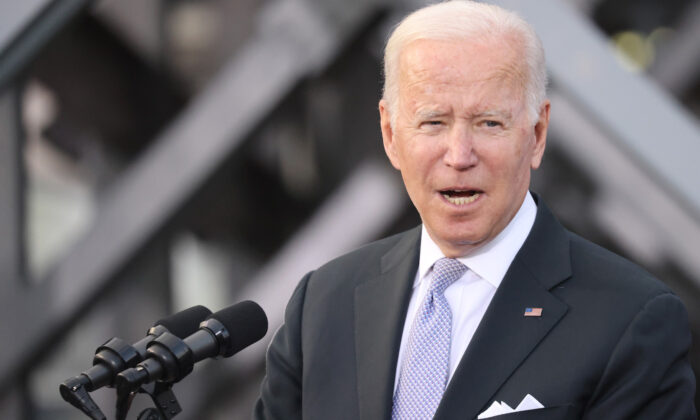By Joseph Lord
President Joe Biden has indicated support for changing or abolishing the filibuster in order to pass election legislation, a substantial shift from his long-touted position in favor of the Senate’s peculiar rule.
The flip came after Republicans on Wednesday filibustered Democrats’ “Freedom to Vote” Act, an election bill crafted under the guidance of moderate Sen. Joe Manchin (D-W. Va.).
“I think we’re going to have to move to the point where we fundamentally alter the filibuster,” Biden said after the vote.
“It remains to be seen exactly what that means in terms of fundamentally altering it, whether or not we just end the filibuster straight up,” Biden added.
The failed bill would have created new requirements for groups to disclose information about their donors, named Election Day a national holiday, and created federal standards for voting by mail, early voting, and voter ID.
Democrats have insisted that these measures are necessary as Republican state legislatures across the country strengthen their voting laws in the wake of inconsistencies in the results of the 2020 election. According to critics of the new state laws, they represent a resurgence of the Jim Crow policies of the Reconstruction era; The laws, opponents claim, are meant to disproportionately target minorities, despite the Supreme Court’s rejection of the claim in 2021 (pdf).
In the past, Biden has been open to some reforms of the filibuster. He has been particularly outspoken in his support for a return to the so-called “talking filibuster.”
Under the “talking filibuster” standard, at least one minority party senator must stand on the floor and keep talking. Current rules allow a senator to declare their intention to launch a filibuster against a bill or motion, and then what’s known as a cloture vote is taken, which requires a 60-vote supermajority for further action on the matter.
Sen. Rand Paul’s (R-Ky.) 13 hour-long speech on the Senate floor to oppose John Brennan’s appointment as CIA director in 2013 is one of the most famous talking filibusters in recent memory. Another example came in 2013 with Sen. Ted Cruz’s (R-Texas) filibuster of the Affordable Care Act, during which the senator read “Green Eggs and Ham” by Dr. Seuss.
In recent years, the rules of the filibuster have been relaxed, effectively putting an end to the talking filibuster.
“I would go back to that, where you have to maintain the floor,” Biden said in July. “You have to stand there and talk and hold the floor.”
Biden’s sudden flip on the Senate rule is indicative of growing frustration among Democrats toward the process, especially after the failure of the bill that many hoped would be palatable to some Republicans.
In an interview, Rep. Jim Clyburn (D-S.C.) said that S.1 dealt with “constitutional rights” and “should not be subjected to a filibuster.”
Sen. Jeff Merkley (D-Ore.), who introduced a different election bill in the Senate, said in an interview with CBS that it would be “election Armageddon” if filibuster rules are not changed. Sen. Amy Klobuchar (D-Minn.) voiced support for changing or removing the filibuster, saying that “at some point you gotta get things done.”
Many Democrats Continue to Hold Tight to Filibuster
Still, despite Biden’s substantial influence as the leader of the Democratic Party, any change to the filibuster will have to pass muster with moderates in the party who have been outspoken in support of the rule in the past.
The most outspoken Democratic proponent of the filibuster has been Manchin. In an interview with Fox News, Manchin was asked if he would consider getting rid of the filibuster under any conditions. He responded that he “would make it harder to get rid of the filibuster.”
“I’m supporting the filibuster. I’m gonna continue to support the filibuster. I think it defines who we are as a Senate,” he said, adding that while he would make it harder to get rid of it, he would support changing the rules to bring back the talking filibuster; the filibuster “should be painful if you wanna use it,” he argued.
Manchin recently re-upped this position. Manchin told reporters that he would not support changing the filibuster rules even to raise the debt ceiling.
“The filibuster has nothing to do with the debt ceiling,” Manchin said then. “We have other tools that we can use. If we have to use them, we should use them.”
And Manchin is not the only Democratic senator opposed to ending the filibuster.
Sen. Kyrsten Sinema (D-Ariz.) took to “The View” to defend the Senate rule. Sinema was accused of valuing the filibuster, which the host called “a relic of the Jim Crow Era,” more than voting rights.
Read More From The PatriotAmerican
Sinema argued that the filibuster is “a tool [for the] protection for the minority,” arguing that Democrats have used the “tool” just as often when they were in the minority.
Sen. Diane Feinstein (D-Calif.) has also made comments in support of keeping the filibuster as-is.
While Democrats are able to change the rules by a simple majority vote, Biden must win over these holdouts in his party for any such change to be possible.

